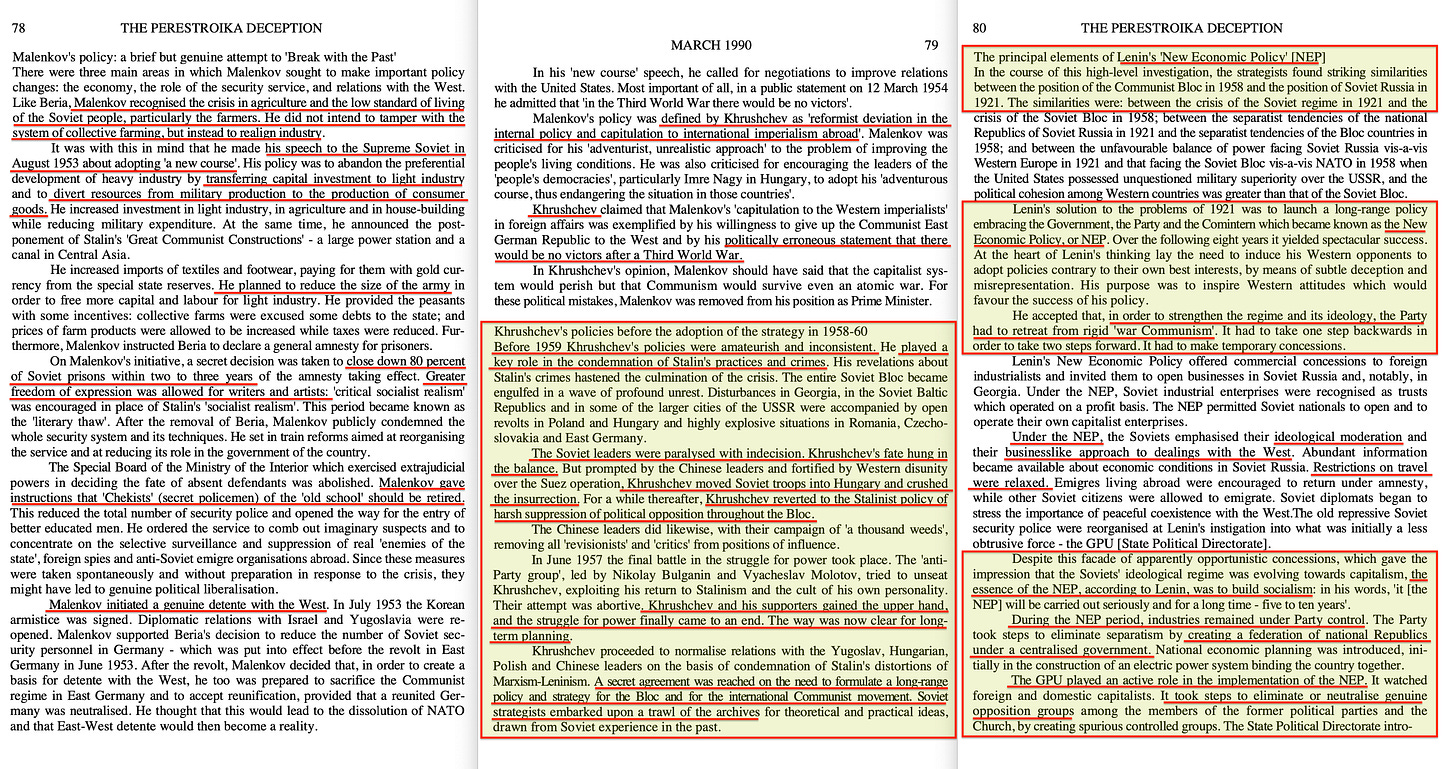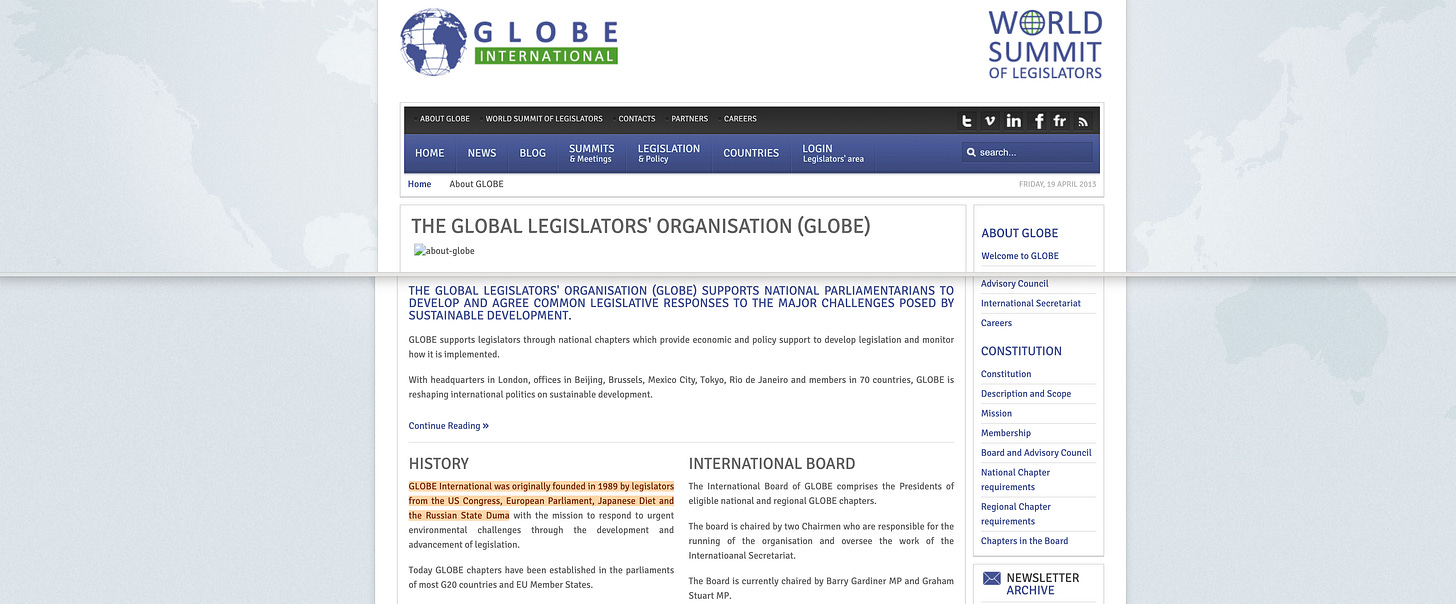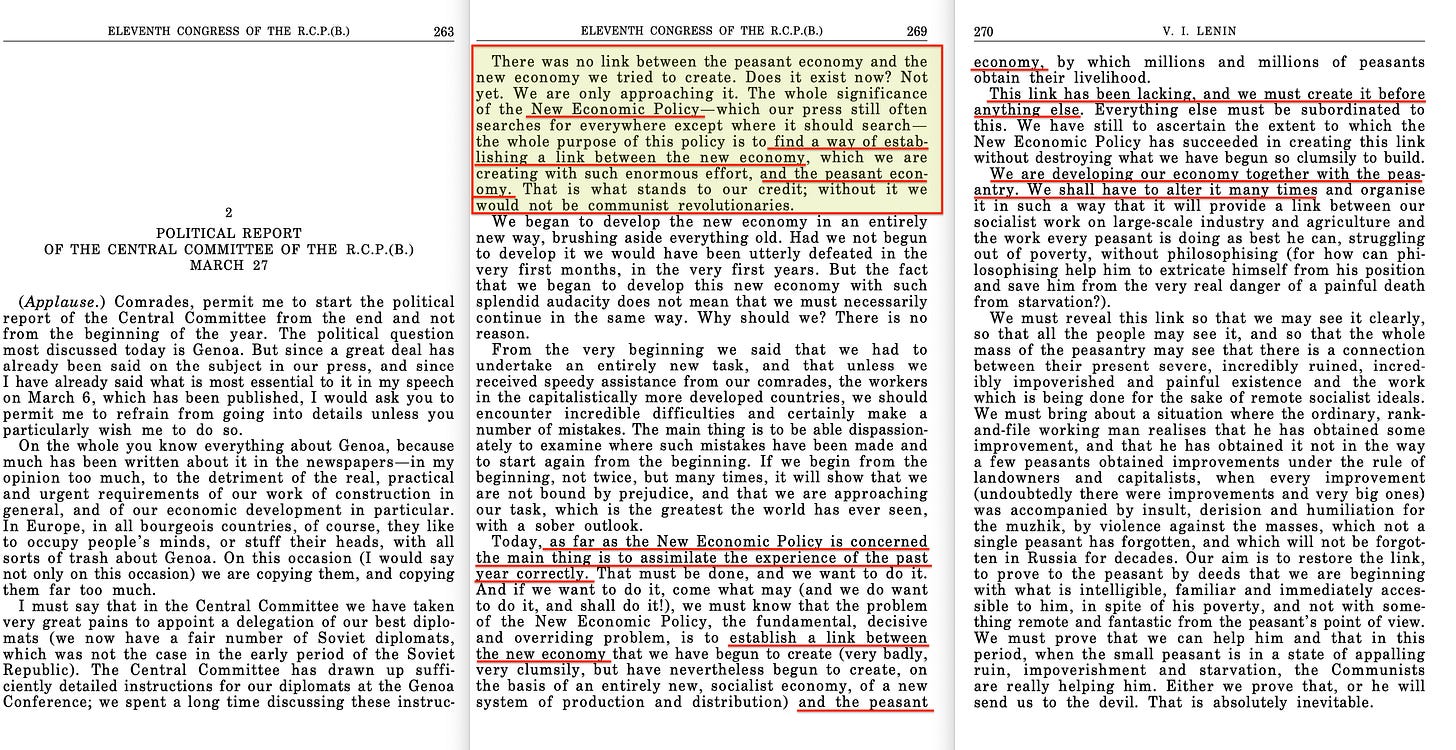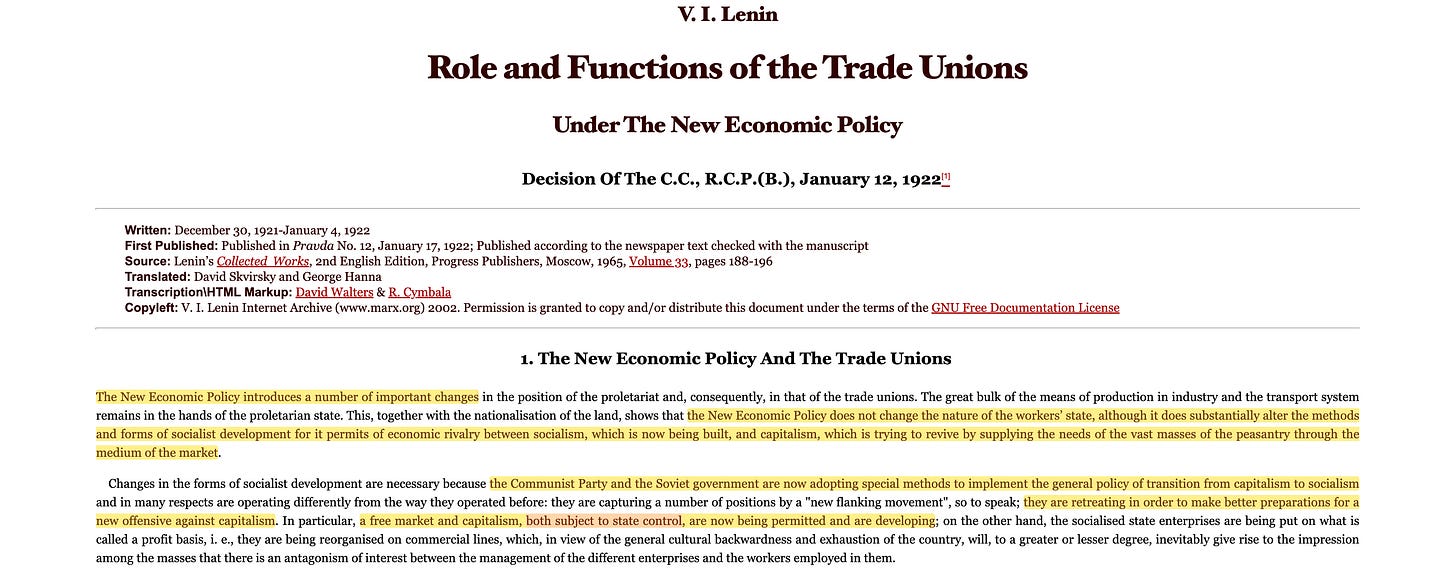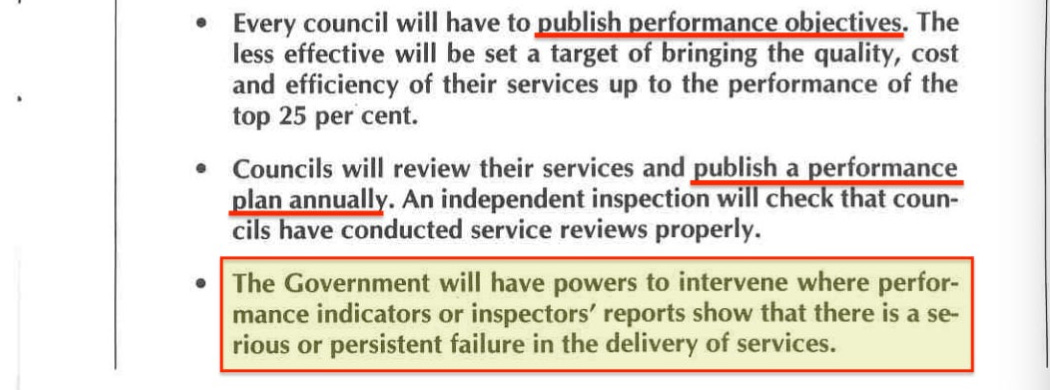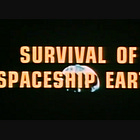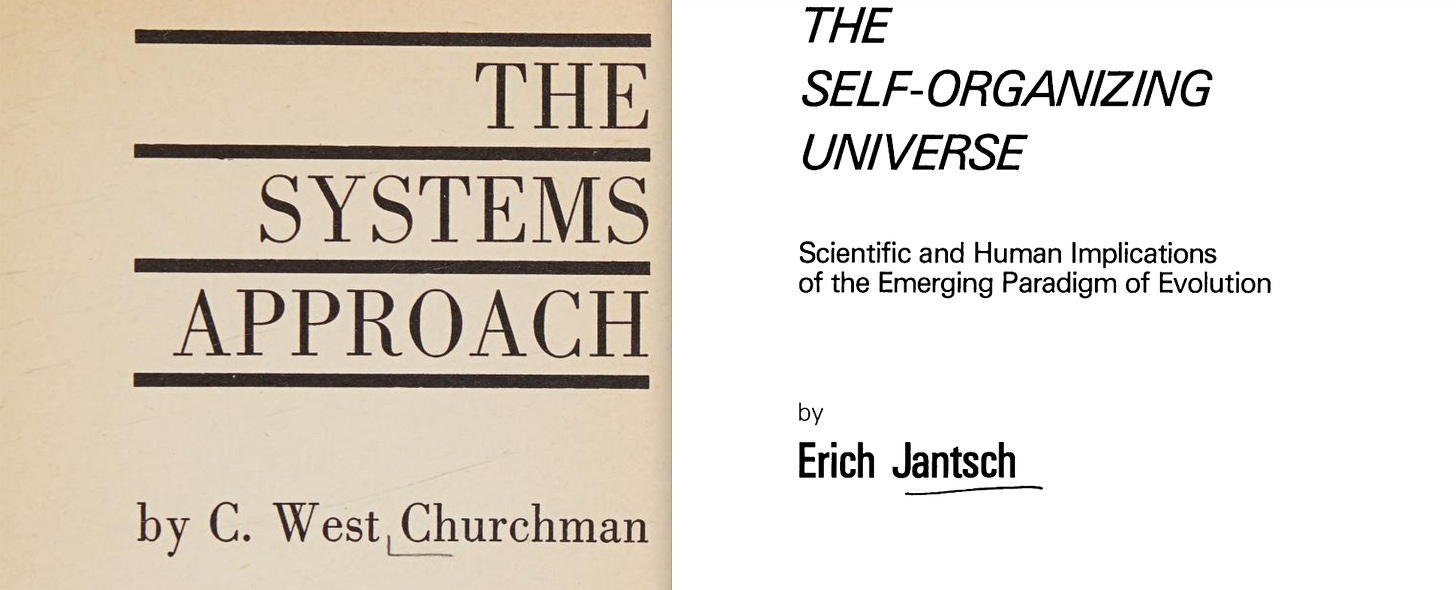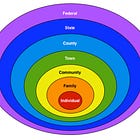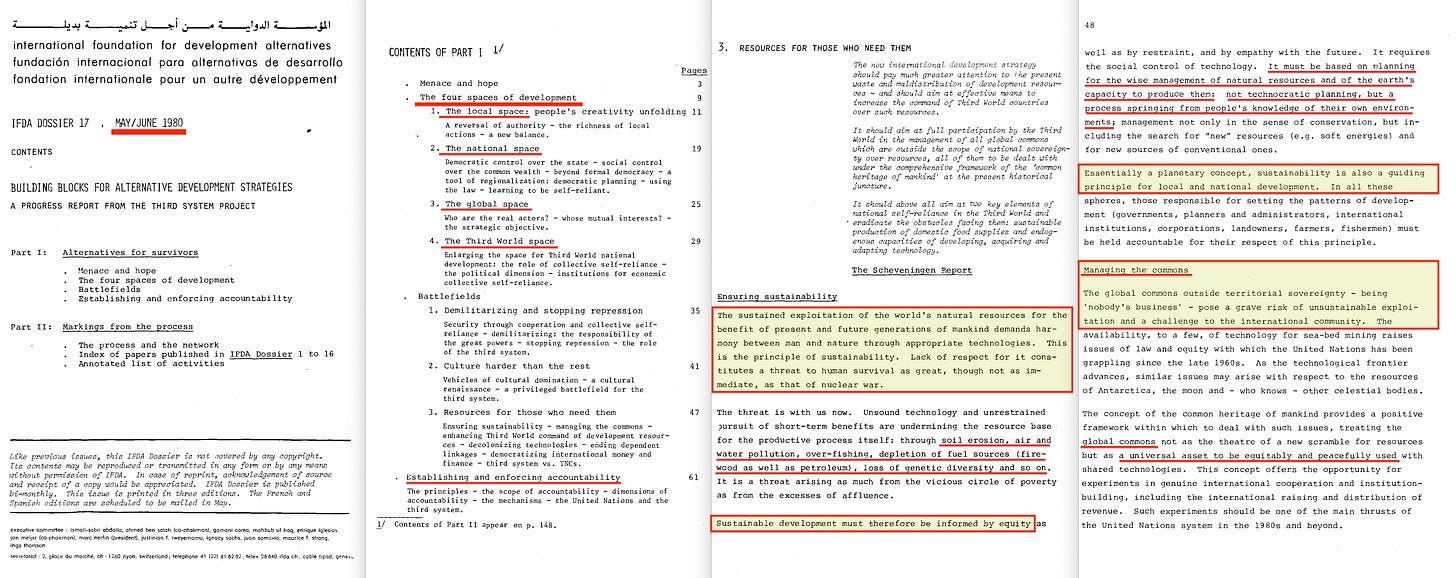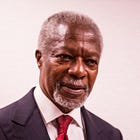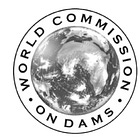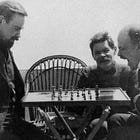The New Economic Policy
On December the 15th, 1961, KGB agent Anatoliy Golitsyn defected to the United States. And though the official historian for MI5, Christopher Andrew, described him as an ‘unreliable conspiracy theorist’, he further added that ‘intelligence data provided by Golitsyn were reliable‘1.
Golitsyn’s two most recognisable books include ‘New Lies for Old‘ published in 1984, and his 1995 ‘conspiracy theory’, claiming that Mikhail Gorbachev’s modernisation was nothing short of a farce -
The Perestroika Deception2.
I will be the first to say - The Perestroika Deception is not a great book. It’s a choppy read with poor information structure, frequently repeating itself, in fact, does so, over and over and over and over and over and over and over again, until your mind starts to wander. Somewhat ironically what’d you’d expect from a stereotypical internet characterisation of a drunk Russian.
And the topic indirectly addresses a question I’d previously left open. Because on the trail of Tony Blair’s Third Way, I never did manage to trace the origin beyond Blair’s 1991 Marxism Today article. Sure, Anthony Giddens is involved, but it all just sort of… fizzles out.
But I recently believed to have discovered a breakthrough through locating the ‘Third System’ originating in the 1970s (more on that later)… but Golitsyn well and truly moves that goalpost - back in time by a further 5 decades! Because as it transpires, the similarities with Lenin’s New Economic Policy are simply undeniable. But before we go there, let’s first establish the history relating to, primarily, Khrushchev.
We enter on page 76 -
‘Only Zhdanov, Secretary of the Party's Central Committee and a possible successor to Stalin, with a small group of fellow Leningrad associates, dared to discuss alternative policies among themselves. Zhdanov and his group recognised the explosive nature of the situation in the USSR and its satellites. They saw a solution to the crisis in the application of Lenin's New Economic Policy experience.‘
Zhdanov, in short, wanted to revive the NEP experience. But needless to say, this was during the Stalin years and consequently -
‘Zhdanov died suddenly in mysterious circumstances, and his associates were shot.’
However, his efforts were not in vain, as -
‘Ironically, Zhdanov's secret plans to apply the experience with the New Economic Policy were to be adopted by Khrushchev's strategists when they formulated their long-range strategy of 'perestroika'.‘
I get it. ‘Conspiracy theory’, no? After all, everyone saw the Iron Curtain fall live on CNN, with those people tearing down the Berlin Wall, and with even David Hasselhoff ‘Looking for Freedom’, right?
Well.. there are some oddities here - but more on that later.
As for Khrushchev, he initially criticised Stalin -
‘Before 1959 Khrushchev's policies were amateurish and inconsistent. He played a key role in the condemnation of Stalin's practices and crimes.‘
… only to… become Stalin -
‘Khrushchev moved Soviet troops into Hungary and crushed the insurrection. For a while thereafter, Khrushchev reverted to the Stalinist policy of harsh suppression of political opposition throughout the Bloc‘
But this didn’t prove popular, and ultimately led to a power struggle. However -
‘Khrushchev and his supporters gained the upper hand and the struggle for power finally came to an end. The way was now clear for long-term planning.‘
… when Khrushchev finally settled that account, the long-term planning could begin.
‘A secret agreement was reached on the need to formulate a long-range policy and strategy for the Bloc and for the international Communist movement. Soviet strategists embarked upon a trawl of the archives…‘
And that trawl ultimately led to Lenin’s New Economic Policy.
‘During the NEP period, Lenin established that the Party's information policy should be based on a double standard concerning what should be revealed about the NEP to the Party membership and what should be revealed to the public.‘
Next follows a number of quotes which I have not been able to locate - not least because no ‘Lenin’s Collected Works Volume 54’ exists. But having said that, I have experienced similar issues in the past, often caused by writers referencing works in a different language. It’s a valid concern, but there are parts of this which I’m willing to entertain, because it links up with other events of note. However, as I can’t logically discredit it, the following quote deserves to be considered on its merit -
‘… Lenin understood the need to limit concessions to economic matters… rejected a proposal from his Foreign Minister, Chicherin, who had suggested that 'for solid compensation', the Soviets should deceive the Americans by making a small ideological concession and including a few non-Communists in the ruling organisation - thereby passing it off as a representation institution. In their hunt through the archives, the strategists under Khrushchev rediscovered this device - and resolved to implement it on a far larger scale.‘
I have trawled many, many, many papers, and I’ve seen how… frankly, idiots were included on executive panels in so many contexts… because it never was the executive panels which called the shots. Rather, those executives were presented fabricated science by obviously biased foundation-funded ‘scientists’ in an absurdly biased manner. You know, as we saw during the alleged pandemic. And the following I’ve experienced in writing on plenty of occasions as well -
‘… the potential for exerting influence on the West through the use of agents among Soviet scientists and intellectuals; …‘
The Soviet Union were more than happy to have their cherry picked scientists attend international conferences - because it was a perfect place to influence academics from other nations. Physics, mathematics, agricultural sciences, space and aeronautics especially were fields in which the Soviet Union at this stage excelled. And this was thus highly ripe for covert influence peddling, cultural exchange, and for sakes of propaganda - with these3 three4 books5 documenting as much.
However, the next quote I have no trouble confirming -
‘'The works of Lenin and his ideals of socialism remained for us an inexhaustible source of dialectical creative thought, theoretical wealth and political sagacity... Turning to Lenin has greatly stimulated the Party and society in their search to find explanations and answers to the questions that have arisen... The Leninist period is indeed very important‘
There it is - in Gorbachev’s very own book, titled ‘Perestroika’.
And I personally observed all sorts of - dare I say - conspiracy theories relating to Trump’s 2020 election loss (legit or not) being some ‘4D Chess’ type operation and hence you should definitely just sit back and relax because ‘patriots have it under control’ -
‘Drawing on the GPU's experience with 'The Trust', the Communist security services have created their own versions of 'political opposition'‘6
And I have also commented on the nuclear debate previously -
‘In the USSR and China, nuclear scientists have logically been included because of their potential impact on the disarmament debate. The KGB and the other services have succeeded in introducing these movements to Western intelligence services and to the West at large. The West has accepted them as genuine and has staked its future on them.‘
But ultimately -
‘The main objectives of the strategy of 'perestroika' are… To induce Western responses which will accelerate the process of Communist renewal and the transformation of Communist regimes into attractive models of 'socialism with a human face'… To create favourable conditions for Communist world victory through convergence of the two systems.‘
When the Iron Curtain fell, I never personally quite understood how the likes of Poland and the Czech Republic especially managed the transition rather that well, as you’d surely have to retrain a new class of political leaders, and/or the civil service. But the one thing I do recall commonly hearing at the time was that all the communists suddenly had become social democrats overnight.
And as for the second part… that was essentially the conclusion of ‘Discovery’.
On page 93 we further discover -
‘Fukuyama implies that Shevardnadze was sincere in his statement that 'the struggle between two opposing systems is no longer a determining tendency' and that the effort to build up material wealth and the protection of the environment have acquired 'decisive importance'.‘
The former quote is from 19887, and the claims relating to environmentalism holds water, not only because Mikhail Gorbachev suddenly became an avid pro-environmentalist post-collapse of the Soviet Union, even founding the Green Cross International in 19938…
… but also because because GLOBE was co-founded by9 -
‘GLOBE International was originally founded in 1989 by legislators from the US Congress, European Parliament, Japanese Diet and the Russian State Duma with the mission to respond to urgent environmental challenges through the development and advancement of legislation‘
… legislators from the Russian Duma in 1989. Who by logical deduction must have been… communists.
But the reality of the situation is quite simply that the May 23, 1972 agreement10… conclusively closes the argument. And practically as soon as that agreement was signed by both DC and Moscow, the IIASA launched11 - and they quickly became the world’s premier global modellers (General Systems Theory, Digital Twins). And what does that agreement outline?
‘… joint development and implementation… controlling the impact of human activities on nature… legal and administrative measures for protecting environmental quality‘
Controlling human activity on nature through common legislation (and never you mind the vast different in political systems) - which then further goes to explain Federov’s opening paper at the First World Climate Conference.
And this quote appears rather apt in this context -
‘Sun Tzu wrote: 'I base my plans for victory on form, but this is not understood by the common man. Although each has the ability to behold things as they appear, none understands how I have forged victory'‘
Look, I accept if you’re not convinced. Those incorrect references really do grind my gears as well. But a lot of things line up. And besides - given what’s at stake, perhaps this calls for an application of the precautionary principle12 which those budding central planners are otherwise so keen on?
And as for my comments earlier, relating to the Czech Republic bridging the transition strangely well -
‘It is therefore logical for the new President of Czechoslovakia to advise the United States to support Gorbachev and finance 'perestroika' or to accept a Communist as his Defence Minister or, when asked whether his country would remain in the Communist alliance, to reply 'if a totalitarian system is dismantled some peculiarities remain. Some things I cannot discuss with "The New York Times" before I discuss them with President Gorbachev in Moscow'.‘
That president, incidentally, was the noted co-founder of the World Governance seeking Collegium International, and noted ‘anti-consumer, humanitarian, environmentalist, civil activist’ (which, if you ask me, sounds like a really roundabout way of saying ‘communist’) -13 Vaclav14 Havel15.
Incidentally, in company of Milan Kucan, who faced a similar situation in Slovenia.
And as for Poland -
‘It is logical for the new Polish non-Communist Prime Minister to suggest that Soviet troops should remain in Poland to protect Soviet communications with their troops in Germany. It is logical that Lech Walesa should have declared that he wanted a Communist as Poland's President or, as a potential candidate himself to that high office, should have said 'we want to cooperate constructively with the Communist authorities'.‘
Of course, that love affair was mutual16.
Finally, a few quotes in closing -
‘The power of the military establishments remains unaffected by the changes:‘
The Soviet collapse did impact the military, particularly with separations like Ukraine's. However, it’s undeniable that the Russian military in contemporary times is a focal point of Putin administration modernisation efforts.
‘The security services are 'criticised' and respond by changing their names;‘
Following the fall of the Soviet Union, the KGB was formally dissolved and underwent a series of reorganizations. Over time, however, and particularly under Putin, the FSB regained significant influence, echoing some of the centralized power the KGB once had. However - unlike during the heyday of the Soviet Union - there are today multiple organizations instead of a single, all-powerful entity.
And finally -
‘In this matter, the Communist strategists are following Lenin's advice and are using these specifics in the common strategy. According to Lenin: 'All nations will come to socialism. This is unavoidable. But all will not come in the same way.’‘
So at this stage we really do need to establish exactly what the New Economic Policy entails. And who’s be in a better position to explain, but the origin of the NEP itself - Lenin. From his Collected Works Volume 3317 which probably is the most relevant, as it pertains to the period of the launch of the NEP itself. And we on page 28 find the first associated quotes -
‘The period of unprecedented proletarian achievements in the military, administrative and political fields has given way to a period in which the growth of new forces will be much slower…. In the economic field, development is inevitably more difficult, slower, and more gradual; …‘
It almost sounds… Fabian’esque… but I suspect this is actually Bogdanov, not Lenin. Either way, Lenin continues -
‘We shall make as many concessions as possible within the limits, of course, of what the proletariat can concede and yet remain the ruling class.‘
At this stage of the revolution, the experiment almost collapsed on itself. And thus, war communism became the New Economic Policy, which was prepared to concede… just about anything, provided the party remained in power.
Page 66 adds -
‘The whole question is who will take the lead. We must face this issue squarely-who will come out on top? Either the capitalists succeed in organising first-in which case they will drive out the Communists and that will be the end of it. Or the proletarian state power, with the support of the peasantry, will prove capable of keeping a proper rein on those gentlemen, the capitalists, so as to direct capitalism along state channels and to create a capitalism that will be subordinate to the state and serve the state.‘
Lenin, in short, suggests keeping capitalism on a leash. Permit private enterprise, provided the Communist Party remains in charge. And as for my comment relating to Bogdanov -
‘Today we are confronted with cultural tasks, those of assimilating that political experience, which can and must be put into practice.‘
A primary difference between Lenin and Bogdanov was that Lenin was more focused on seizing power, while Bogdanov’s interest concentrated on creating the apparatus to ensure endurance. And that’s where culture steps into the frame.
‘The task of raising the cultural level is one of the most urgent confronting us.‘
Bogdanov’s intent behind the eradication of illiteracy related to cultural engineering being more efficient that way - and Lenin’s suddenly on the same page -
‘First of all they are taught to read and write. If we have not yet solved this elementary problem it is ridiculous to talk about a New Economic Policy… he must have something to read, he must have newspapers and propaganda pamphlets… That is why we must, in connection with the New Economic Policy, ceaselessly propagate the idea that political education calls for raising the level of culture at all costs.‘
Yet, Lenin wasn’t blind to his contemporary troubles -
‘… it cannot be waged by propaganda alone.… literacy alone is likewise not enough. We also need the culture which teaches us to fight red tape and bribery.‘
A major issue when crossing to communism from capitalism relates to market forces. Capitalism essentially revolves around trade, and Lenin was more than aware of the shortfall of communism in that regard -
‘We shall have to learn much, and we have realised that we still have much to learn‘
Yet, for those who object on grounds of alleged state communism -
‘Therefore, the most important thing for us was to lay the economic foundation for socialist economy. We could not do it directly. We had to do it in a roundabout way. The state capitalism that we have introduced in our country is of a special kind. It does not agree with the usual conception of state capitalism. We hold all the key positions. We hold the land; it belongs to the state‘
… the state communism practiced by the early Soviet Union was - per Lenin - very different to that outlined in theory, as the Communist Party not only controlled all central, key positions, but further all the land. And as for the private enterprise allowed to… cooperate for sakes of the ‘common good’ -
‘Firstly, in this way we are learning how to trade, and that is what we need. Secondly, we are always in a position to dissolve these companies‘
The Communist Party is in control, make no mistake.
And to ensure no-one challenges Lenin’s definition of State Capitalism -
‘They did not notice, however, that I used the term "state capitalism" first to connect historically our present position with the position adopted in my controversy with the so-called Left Communists; also, I argued at the time that state capitalism would be superior to our existing economy. It was important for me to show the continuity between ordinary state capitalism and the unusual, even very unusual, state capitalism to which I referred‘
And on co-operatives, even those have a special definition per Lenin -
‘… co-operatives… when we combine private capitalist enterprises-but in no other way than on nationalised land and in no other way than under the control of the working-class state-with enterprises of a consistently socialist type… a third type of enterprise… Under our present system, co-operative enterprises differ from private capitalist enterprises because they are collective enterprises if the land on which they are situated and the means of production belong to the state, …‘
But given that (practically) all land was confiscated, we really only talk of situations where the means of production did not belong to the state - which at the time constituted an absolute minority, or in Lenin’s own words -
‘co-operation under our conditions nearly always coincides fully with socialism.‘
As for the role of traditional capitalism relative to communism -
‘There was no link between the peasant economy and the economy we tried to create. Does it exist now? Not yet. We are only approaching it. The whole significance of the New Economic Policy-which our press still often searches for everywhere except where it should search - the whole purpose of this policy is to find a way of estalishing a link between the new economy which we are creating with such enormous effort, and the peasant economy‘
… the New Economic Policy, also set out to establish a mechanism of transition between the two. Because, if nothing else was learned, Lenin was acutely aware that going ‘cold turkey’ most certainly did not work.
Lenin further realised that the political capital available with farmers would not last indefinitely, and thus considered the NEP a tactical retreat which would enable a common march with those same farmers -
‘Is this NEP fit for anything or not? If the retreat turns out to be correct tactics, we must link up with the peasant masses while we are in retreat, and subsequently march forward with them a hundred times more slowly, but firmly and unswervingly, in a way that will always make it apparent to them that we are really marching forward.‘
Yet, bottom line, Lenin knew they ultimately had to deliver -
‘The capitalist was able to supply things. He did it inefficiently, charged exorbitant prices, insulted and robbed us. The ordinary workers and peasants, who do not argue about communism because they do not know what it is, are well aware of this.
"But the capitalists were, after all, able to supply things are you? You are not able to do it.”‘
And to that extent, Lenin certainly realised the limit of their capacity -
‘We cannot run the economy. This has been proved in the past year.‘
In other words, though the communists would allow private enterprise, they would sit tightly on control of the land, the key positions, and ‘the common good’. In fact, via Lenin’s comments at the Eleventh Congress18 -
‘We Communists shall be able to direct our economy if we succeed in utilising the hands of the bourgeoisie in building up this economy of ours and in the meantime learn from these bourgeoisie and guide them along the road we want them to travel… We must see to it that the numerous elements with whom we are co-operating, and who far exceed us in number, work in such a way as to enable us to supervise them; we must learn to understand this work, and direct their hands so that they do something useful for communism‘
Capitalism on a leash as directed by the communists. They, and they alone, set the objective, the road on which they travel.
And from Lenin’s comments relating to ‘Role and Functions of the Trade Unions - Under the New Economic Policy‘19 we learn -
‘… the Communist Party and the Soviet government are now adopting special methods to implement the general policy of transition from capitalism to socialism… they are retreating in order to make better preparations for a new offensive against capitalism. In particular, a free market and capitalism, both subject to state control, are now being permitted…‘
… that capitalism is subject to state control. The communists are in charge.
And though I could quote further examples, let’s finish with a final one; Lenin’s ‘Speech At A Plenary Session Of The Moscow Soviet‘20, which in terms of whether the NEP was a success helpfully adds -
‘… whether the test of our New Economic Policy has yielded the successes we expected. No doubts exist on that score-I can say this quite definitely‘
… and further down that same page -
‘The proletarian state may, without changing its own nature, permit freedom to trade and the development of capitalism only within certain bounds, and only on the condition that the state regulates (supervises, controls, determines the forms and methods of, etc.) private trade and private capitalism.‘
Capitalism on a leash, as directed by communists.
With Stalin’s rise to power, the NEP was discontinued in the late 1920s. However, evil things never truly die, a fact proven by Deng Xiaoping’s famous quote -
‘It doesn’t matter whether the cat is black or white, as long as it catches mice‘
In February, 2020 - just as the alleged pandemic took off - Lawrence C Reardon’s book titled ‘A Third Way’ was published21. And from the introduction -
‘By the late 1970s and early 1980s, Chinese elites realized the limitations of adapting model II and its bureaucratic Stalinist approach. Partly inspired by the Soviet Union’s New Economic Policy (NEP; 1921–29), they initiated experiments with a new “Third Way” for China’s development (development model III). Chen Yun adapted a more moderate version of bureaucratic Stalinism, which promoted balanced growth that relied primarily on the state plan and command economy, supplemented by the market. Deng Xiaoping adopted a more radical version of bureaucratic Stalinism that experimented with outward-oriented development, special economic zones (SEZs), and a greater role for the market. And in the 1990s, Chinese elites had shifted to a new consultative economic paradigm while adapting policies of the older Stalinist political and social paradigms‘
It’s quite the reveal, isn’t it? China’s economic miracle, in short, builds on Lenin’s New Economic Policy, as well as Stalinist paradigms.
But a few years prior - 2017 to be exact - the LSE published a ‘Special Report’ titled ‘From Deng to Xi’22, from which we establish -
‘… it is strange to criticise Deng for a failure to adopt a model he never believed in. He was committed to one party Communist rule and never claimed to believe anything else…‘
… not only was Deng truly a communist, but -
‘… by 1978 was setting the agenda of the collective leadership. His priorities were already clear: domestic stability as a precursor to modernisation which included bringing in investment and technology from abroad, accepting that some regions and individuals would “get rich quickly” and widen inequality, rewards for those advancing science, technology, and productivity improvements, and decentralisation of decision making.‘
… that he was a pragmatic first, who accepted the flaws of the capitalist model in exchange for development. Taming capitalism, in other words.
‘Deng’s approach, for the next decade and a half, is perhaps best understood not in terms of particular policies or theories but in terms of a strategic approach which was long term, flexible, and decentralised and combined economic reform and modernisation with strong, unified government under Party control.‘
Sure, Deng allowed modernisation. He allowed profiteering. But he did so strategically, and always with an objective in mind.
And as for Lenin’s New Economic Policy -
‘Deng’s early life abroad in France (where he first joined the Communist Party) and the Soviet Union gave him a more cosmopolitan outlook than the majority of Chinese leaders, like Mao, who had never left China. In the Soviet Union, he saw at first hand the NEP (New Economic Policy: an experiment in private enterprise and foreign investment under Communist party leadership). The NEP achieved impressive results until Stalin reversed it and Deng appears to have regarded the NEP as the economic model best suited to China (rather than Western capitalism).‘
And as for opportunistic, state-led ‘capitalism’ -
‘Within months decisions had been taken to authorise overseas borrowing, ... A special economic zone was agreed for Shenzhen on the Hong Kong border.‘
Deng’s pragmatic approach yet again shone through, as China experienced much the same issues as those experienced through the Soviet Union’s experiments with the New Economic Policy -
‘There was inevitably political resistance as a result of the unintended consequences of liberalisation. One was corruption. But Deng was philosophical (“when you open the window some flies come in”)‘
And finally, in what is… incredibly relevant in the context of Tony Blair’s Third Way -
‘Performance management was a key element in Deng’s approach to government: decisions based on evidence rather than ideology, sensible targets and measurable results rather than implausible acts of collective will…‘
See, what Tony Blair outlined through his Third Way (chapter 5) in short is… impeccably aligned.
Our next stop is in 1976. The year in which ‘Partners in Tomorrow’ was published23, which not only includes a reference to a ‘Global Compact’ by none other but Conservation Foundation trustee Barbara ‘Spaceship Earth’ Ward… 23 years prior to the earliest reference located by Google and ChatGPT.
‘A New Economic Order Takes Shape… limits to the world's supplies of raw materials, thresholds to the amount of pollution the world's ecosystems can bear and wholly unforeseen physical interdependences - of soil, of water, of winds and climates - which, unsuspected even a decade ago, could do permanent planetary damage to rich and poor nations‘
In fairness, it’s not a terribly exciting paper, though the reference to ‘a new economic order‘ can be considered par for the course.
No, what’s of far higher importance is this paper by Marc Nerfin -
‘A New U.N. Development Strategy for the 80s and Beyond: The Role of the "Third System"‘
And let’s just get the checkmarks in… it’s long-term…
‘Preparations have begun within development the United Nations for a new strategy which will probably cover not only the next decade but also the years beyond that.‘
… it’s global - ‘… the discussion on development and international cooperation has extended well beyond intergovernmental organizations…‘
… it’s participatory, and inclusive of social forces (Civil Society) - ‘… participation of individuals, institutions and social forces outside the formal United Nations system...‘
… and it seeks ‘… to establish a new system of world-economic relations based on equality and common interest of all countries…‘
OK, the final part of course is the ‘New International Economic Order‘24, but -
‘It is time to give the "third system" that is, one which is closer to people and social forces, a better chance to have its voice heard in the debate.‘
And to this extent, we need -
‘… participation of researchers and social organizations - those constituted by workers, women, youth, political parties, religious groups, consumers, ecologists, and others‘
… Civil Society Organisations. It may not use those words exactly, but that’s clearly what it calls for.
As for those parameters… ‘development should be need-oriented,‘ - that’s called a purpose, or a common objective. A public good.
‘… development should… define in full autonomy its values and the vision of its future… cannot be a linear imitative process,‘ … which very much sounds like West Churchman’s Systems Approach25, while ‘… development should be self-reliant…‘ sounds like Jantsch’s Self-Organising Universe26.
And ‘It is thus a holistic process encompassing political, cultural, social, economic, technological as well as psychological elements.‘… well, that could relate to either Jantsch or Churchman… or even Ken Wilber, while -
‘… the different partners involved, be they governments, economic organisations or social actors…‘
… very much sounds like a Public-Private-CSO collaboration aka Trisectoral Network ‘Stakeholder’ governance.
And around the same time (1977), the International Foundation for Development Alternatives launched, and they issued ‘IFDA Dossiers’ on ‘The Third System Project’
And beyond mention of the ‘Third System’, what stands out here27?
Oh gee, the participation of none other but Maurice Strong. The man who quite literally is everywhere in terms of the ‘ecologically sustainable‘ agenda.
The term ‘Sustainable Development’ is widely credited to Brundtland, 198728. But it was in fact the IUCN who in March, 1980 first made use of the term29. Or so goes the official story, anyway, because an IFDA dossier used this same term in 197930.
But the more interesting dossier dates to May/June, 198031. Already in the contents we see a clear global/national/local differentiation, mapping fairly well to contemporary claims of ‘decentralisation to the lowest appropriate level’. But the entire document is draped in alleged environmentalism, planetary stewardship, sustainability, and even nuclear armageddon alarmism. Eventually, we end up on page 48 inclusive of a section titled - ‘Managing the commons‘
… but how should these be managed? Perhaps through ‘The Third System’, described on page 69 as -
‘The state and the market are the two main sources of power exercised over people. But people have an autonomous power… the third system includes groupings actively serving people’s aim and interests, as well as political and cultural militants… putting pressure on the state and economic power and by organising to expand the autonomous power of people‘
… also known as ‘civic activism’… and incidentally, Tony Blair described something strangely similar in his ‘Third Way’ -
As we already covered Blair’s Third Way… how about Gordon Brown’s 1993 warnings on strife, relating to their - I kid you not -‘new economic policy’32 -
‘In a London speech, he said: 'The old battle of ideology between state power and free market forces is dead. To pursue a doctrine of state power or market forces is counter-productive.‘
… which even details exactly the kind of collaboration between the public and private which Tony Blair detailed in his 1991 article in… Marxism Today33… further detailing that the two should work together in the public interest.
And across the Atlantic, Bill Clinton similarly worked to push through ‘The Third Way’ in the United States. And in 1999 he delivered remarks34, outlining… the third way… a new economic policy… a new environmental policy… and protection and conservation of the environment should primarily travel through market-based instruments, and thus the World Trade Organisation… and the International Environment Organisation.
Oh gee, isn’t that exactly what they discussed earlier in the decade?
And in 1997, Kofi Annan reformed the United Nations, using a Maurice Strong-authored template finalised through the World Commission on Dams… and this, of course, utilised a ‘Stakeholder Approach’, though it should really be referred to by its alternate title…
… which would be either the ‘Global Public Policy Network’, or the ‘Trisectoral Network’, as these combine the Public stakeholders with the Private and… Civil Society Organisations. And it was this model of global governance, which was subversively introduced through Agenda 21.
But this model saw its first implementation in UN capacity through the Global Environment Facility, which underpins not only the United Nations Framework Convention on Climate Change, but further the Convention on Biological Diversity.
And those two, when combined, constitute their Grand Plan.
What I say is that -
Lenin’s New Economic Policy.
Deng Xiaoping’s Chinese reforms.
IFDA’s Third System.
Tony Blair’s Third Way.
Wolfgang Reinicke’s Trisectoral Networks.
They all share the exact same structure.
Public - Private - Third Party.
But while the Third Party in the former two relate to the local Communist Party defining the ‘public good’, the latter three all swap said communist party for a Civil Society Organisation… which then goes to define that very same ‘public good’.
So my question here is - what would thus be the logical conclusion, if the CSO was a front for that same Communist Party?
And if the ‘public good’ was environmentalism or planetary stewardship - wouldn’t that suggest that perhaps - just perhaps - the Perestroika Deception is legit?
I really have only one further comment to make. Because the more time I spent, reading up on Lenin’s New Economic Policy, the stronger I sensed Bogdanov’s presence. Sure, I’m aware of the official story - Lenin was mistrustful of Bogdanov, and cut his Proletkult programme down to size. But let’s face it - it would hardly be the first time they’d told an epic lie.
However, Lenin’s cancellation of Bogdanov Proletkult took place practically immediately prior to the launch of the NEP, a programme which - per above - required its own, associated cultural engineering programme. And the fundamental idea behind the New Economic Policy further strongly resonates with Bogdanov’s belief that the true elite does not comprise the owners of the means of production, but rather those who organise production itself.
And though the New Economic Policy is a retreat from the communist model itself, it still insists on keeping a tight grip on the process of defining the ‘public good’ itself, while not ultimately caring about who owns the means of production - another simple fact in expressly alignment with Bogdanov’s Scientific Socialism.
I will however finish on a bit of speculation.
Marxist Socialism, ultimately, is an externalised approach, where a top-down authority imposes its will through coercion.
Ethical Socialism, in contrast, is internal. This approach is about personal ‘development’, and instilling values of morality through subtle brainwashing.
And Bogdanov’s Scientific Socialism… incorporates both. It’s sufficiently flexible to work through both subtle manipulation - and coercion. And for that reason, this reminds me of ‘Game B’, which is typically described as similarly flexible.
So who could be behind all of this?
See you in the next article - Crisis Economics.





